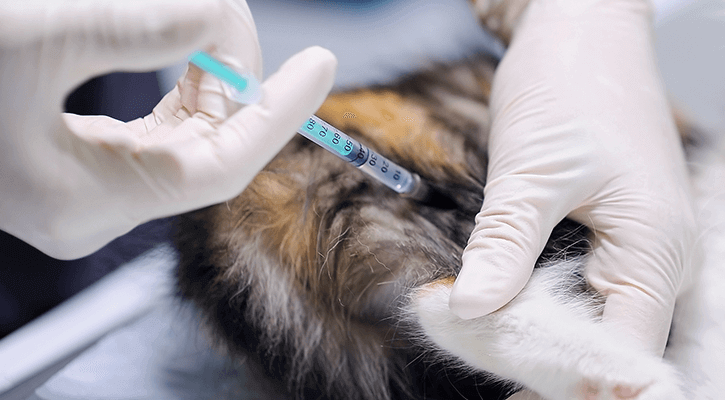
Vaccinations
All dogs and cats should receive their age appropriate core vaccines, regardless if they are indoor or outdoor. If your pet socializes with other pets outside your home or visits boarding kennels, parks, and/or grooming salons there are additional recommended non-core vaccines.
Our vaccine schedule at GVVH is based on the vaccine schedule recommended by the American Animal Hospital Association Guidelines.
It is also important to keep in mind that vaccinations take a few days to a few weeks to become effective.
Benefits of Vaccinating Your Pet
- To protect your pet from contagious diseases.
- It is more cost effective to prevent than treat.
- Some vaccines are mandated by law.
Canine Core Vaccines
Distemper, Hepatitis, Parainfluenza and Parvovirus (DHPP)
Commonly called the “distemper shot,” this combination vaccine protects against the four diseases in its full name. It is bolstered every 3 – 4 weeks until 16 weeks of age for puppies. A puppy may get this vaccine 3-4 times depending on the age the breeder or shelter started the series.
Rabies
The rabies vaccine for dogs, administered through injections once every year or three years (depending on dog’s age), is a vital preventive measure to protect against rabies.
Canine Non-Core Vaccines
Leptospirosis
Often included as part of the distemper combination vaccine (making it a DHLPP). With the first vaccine being given around 12 weeks, it is then bolstered every 3 – 4 weeks until 16 weeks of age for puppies. A puppy will get this vaccine 2 times before they will have full immunity. After that, the dog will get the vaccine once a year.
Lyme Disease
A bacterial infection carried by ticks, this disease is extremely prevalent in certain parts of the country. The first vaccine being given around 12 weeks, it is then bolstered every 3 – 4 weeks until 16 weeks of age for puppies. A puppy will get this vaccine 2 times before they will have full immunity. After that, the dog will get the vaccine once a year.
Canine Influenza
Outbreaks are prevalent in animal shelters and boarding kennels. This vaccine should be given annually.
Bordetella (commonly called “kennel cough”)
This virus causes an extremely contagious upper respiratory infection. It should be given annually.
Feline Core Vaccines
Feline Viral Rhinotracheitis, Calicivirus and Panleukopenia (FVRCP)
Commonly called the “distemper” shot , this combination vaccine protects against three diseases: feline viral rhinotracheitis, calicivirus and panleukopenia (sometimes called “feline distemper”). A kitten may get this vaccine 3-4 times depending on the age the breeder or shelter started the series.
Rabies
This virus is fatal and all mammals, including humans, are susceptible to infection. The rabies vaccine is given once every year or three years depending on the feline’s age.
Feline Non-Core Vaccines
Feline Leukemia (Felv)
This vaccine is generally only recommended for cats that go outdoors, but should be considered for all cats as they may escape. With the first vaccine being given around 10 weeks after the kitten has been tested for FeLV and FIV. The vaccine is then bolstered every 3 – 4 weeks until 16 weeks of age for kittens. A kitten will get this vaccine 2 times before they will have full immunity. After that, the cat will get the vaccine one more time around their first birthday. The vaccine should be continued annually.
Learn More
To learn more about the importance of getting your pet vaccinated, or to request an appointment, schedule online or call us at 614-444-9696 .
